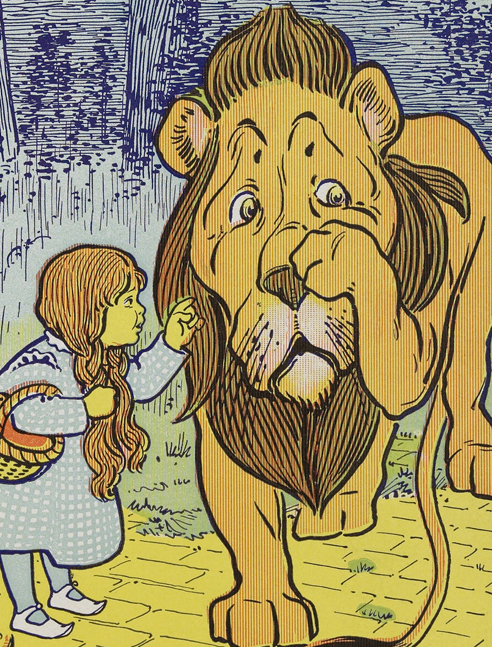The testing point

Back To Basics Series
Jewish Family Education With Candace R. Kwiatek, The Dayton Jewish Observer
While shopping at a local lingerie store, my friend J observed another patron slipping items into her oversize handbag as she went from display to display. J pointed at the woman and called out, “You are stealing! You stop that stealing right now!”
As the shoplifter marched defiantly out of the store, J turned to the cashier and demanded, “Aren’t you going to do anything?”
The cashier shrugged, “This goes on all the time, but our staff has been instructed not to interfere.”
Courage — or its absence — has the power to transform individuals and societies.
“Courage is the least common of all the good traits,” commentator Dennis Prager observes. “But without courage, goodness cannot prevail.”
Although often used interchangeably, courage is not the same as bravery.
Brave, connoting readiness to face and endure danger or pain, has etymological roots in defiant, daring, valiant, bold, rash, untamed, and possibly savage or cutthroat.

From the Latin root cor, meaning “heart” (originally the seat of intellect, morality, emotion, decision-making, and identity), courage is the “mental or moral strength enabling one to venture, persevere, and withstand danger, fear, or difficulty,” according to Merriam-Webster. Courage is action based on inner principles, not feelings or external pressures.
The Bible is filled with “profiles in courage.” Abraham argued with God, Joseph forgave his brothers, Moses challenged Pharaoh. Zelophehad’s daughters faced the Israelite elders to claim inheritance rights. David single-handedly confronted Goliath, and prophets castigated kings. Exiled in Babylon, the Hebrews resisted assimilation, built flourishing Jewish communities, and dared to create new expressions of Jewish ritual and identity.
Ask “Who is courageous today?” and you’re likely to hear about ordinary citizen Tom Beamer of the 9/11 Flight 93, commercial pilot Chesley Sullenberger, who landed on the Hudson, or Japanese diplomat Chiune Sugihara whose visas saved Lithuanian Jews during the Holocaust.
However, the perception that courageous people are bigger than life, innately courageous, and impossible to emulate is wrong.
“Courage is subjective and relative,” writes Rabbi Zelig Pliskin, and doesn’t necessitate being a superhero. Courage can also include coping with hardship, being assertive, maintaining personal dignity, trying something new, and other responses to personal or societal challenges.
While some individuals are naturally courageous, science, psychology, and religion all endorse the notion that courage can be cultivated. Here are five how-tos for building courage.
1. Just like being happy is a choice, decide to be courageous. There really is no excuse for not being courageous; the only requirement is the willingness to pursue it. From the Coaching Institute: “Courage doesn’t turn up in the mail. You got to show up first. Invite courage. Seduce it. Coax it.” Instead of “I can’t” or “I’m not courageous,” say “I don’t yet have the courage,” changing impossible to potential.
2. We may be unwilling to act courageously because we fear what people will say or think. We worry about the loss of approval, friends, income, or advancement opportunities. However, not showing courage comes with a cost as well. Over time we become less courageous, and our ability to improve our character, influence others to do good, and make the world better decreases.
Although most fears are unfounded, view them as opportunities for personal growth. Ask yourself: Do I want to be guided by peer pressure or personal conviction? Replace fears that demoralize with an ennobling one, as the psalmist wrote, “The beginning of wisdom is the fear of God.” View courage as a key ingredient for repairing the world.
3. Do you have a motto, a statement of your core values? “Only when you know your values can you live them,” Rabbi Daniel Cohen teaches.
Decide what kind of character and reputation you want, and align your decisions accordingly. Be willing to stick with your decisions even in adversity.
Rabbi Dianne Cohler-Esses encourages parents to begin early, teaching even young children to be advocates for themselves and their values. Developing the confidence and ability to stand up for oneself takes practice.
4. Repetition is the mother of invention. Act and speak as if you have courage. Mentally revisit your moments of courage. Make small courageous decisions regularly.
“One positive, life-affirming choice inherently energizes us to make further such choices in the future,” Cohen points out.
Courageous choices build fortitude and self-confidence. Acknowledge your courageous actions. Celebrate each success.
5. Heroes inspire us, help us figure out how to live, and move us to action. “They are especially important for children,” Cohler-Esses notes. “The more we expose our children to those who act from an internal sense of right and wrong, the more our children will develop their own internal moral compasses.”
Share stories of courageous acts, from the Bible to modern life, every day.
Why should we aspire to be courageous? In the words of C.S. Lewis, “Courage is not simply one of the virtues, but the form of every virtue at the testing point.”
Only courage prevents virtues — foundational principles for goodness and morality — from yielding to danger, peer pressure, ideology, convenience, laziness, or emotion. Thus, without courage, goodness cannot prevail.
Literature to share
How the Moon Became Dim by Ruth Wiseman. Although the moon makes a case for being the “greater light” of Creation, she learns that she is to be the smaller, dimmer light of the nighttime sky. Disappointed, she eventually discovers her own special features and unique role in the world. Bringing an ancient midrash to life, the prose and beautiful illustrations in this book communicate the notion that each of God’s creations is perfectly designed to play its own essential role in the universe. Explore the summer’s nighttime sky while enjoying this lovely young children’s book.
My Jewish Year: 18 Holidays, One Wondering Jew by Abigail Pogrebin. This standout addition to books about the Jewish calendar presents a wholly new view of all 18 of the annual holy days and commemorative historical days in a witty conversational manner that reads like a novel. Woven throughout are history, traditions and their significance, modern perspectives, inspirational rabbinic commentary, and lots of humor that painlessly builds the reader’s Jewish holiday literacy. Highly recommended.
To read the complete June 2017 Dayton Jewish Observer, click here.


